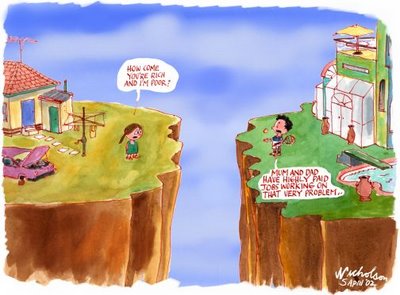
The School of Life is a pretty good YouTube channel, and they get quite a lot of stuff right. However, its video titled “Why Some Countries Are Poor and Others Rich”, seen below, wasn’t quite what I had expected. It has comments and the like/dislike bar turned off for a reason; I shall attempt to explain and analyse its reasoning.
The video notes that there are 25 rich countries, where the per capita average annual income is over 100,000 dollars a year (this is average income, and not median income, meaning that it’s mostly skewed to the very richest 1% in each country. Yes, that’s why you probably earn less than that).
In the 20 poorest countries, however, the story is completely different- each person earns less than 1000 dollars a year, or less than 3 dollars a day. While all countries are growing, the poorest are growing much slower than either developing or developed nations. Zimbabwe, for example, would take 2722 years before it obtained a standard of living equivalent to one of today’s rich countries. Ouch. The video points out three reasons for this despairing disparity:
1) Rich Countries Have Better Institutions and Are Less Corrupt
Rich countries have good institutions, poor ones have bad ones. The video does not explain the importance of institutions and moves on to corruption.
Half of the wealth earned in the poorest nations are stolen via off-shore bank accounts, preventing them from taxing this money and creating the all-important good institutions mentioned above.
This is a fair point, but instead of explaining that point the video blames it all on “clan-based thinking”… rather than maybe “powerful land-owners” or the obvious “evil governments” and you can see where it is going.
Cronyism would be a more appropriate term than “clan-based thinking”, because even in developed nations which do NOT have clans, preferential treatment of a friend or one’s family can be observed to smaller or larger extent. Cronyism is a symptom of a corrupt system, but hardly the root cause of it all. For that, the video blames… culture… wait, what?!
Instead of explaining THAT bombshell, the video states that the poorest nations are also the most religious and the richest are the least… conflating religion with culture… and then stating that 19 of the richest nations have 70% or more people who believe that religion is not important to them. The US is apparently the exception that proves the rule, because of superficial reasons, protestants are better.
Whereas, the poorest people believe greatly in religion… and the supernatural (the video goes on to conflate religion with supernatural beliefs, because religion is voodoo.)
Never mind, let’s not even consider “cause and effect” here, let’s not ask ourselves if poor countries believe in the supernatural religions perhaps because they’ve NOBODY ELSE to turn to.
Let’s not ask ourselves if maybe it is religion that allows them to keep clawing through their horrible lives… no no, it’s religion that keeps people from trying to better themselves…
The reason why they are corrupt isn’t because rich nations which depend on their natural resources and cheap labor WANT them to stay poor so that their corporations get the lion’s share of profits…no, it’s all because of religion and culture.
2) Geography
The video speaks of how difficult it is to raise livestock and crops in tropical regions… which isn’t entirely true if we’re talking about the vast plantations of Malaysia which is located in the tropics, but I reckon he meant “dry and arid” so I’ll let that one go.
Tropical plants Dry, arid plants are less packed with carbohydrates (maybe) and plants in general cannot photosynthesis as well in arid conditions. The land is largely infertile (because of desertification). The Tsetse fly also causes domestic animals to be less productive, eventually killing them. It also spreads some of Africa’s numerous diseases. It should be noted that many of these conditions are present in Africa specifically and absent in other poor nations (albeit richer than Africa), despite the continuous generalizations.
The video states that cold, biting temperature is the “foundation stone of civilization”- despite the fact that this argument can easily be turned on its head. One can’t plant at all when winter has come, reducing potential crop growth by a full 40% or more, negating many of the disadvantages Africa faces in terms of crop growth.
Poor nations also ironically posses lots of natural resources- nations with good institutions can become wealthy with these, but ones with poor institutions become poorer because the elite can easily make off with the goods.
After blaming a country’s poorness on its faith in religion and its culture, the video ironically ends off telling the viewer not to blame human failings for poverty. Sigh.
History
We like to see success as an outcome of our own hard work- or the hard work of our ancestors. The problem with people is that they only view history in terms of their own generation and the previous one, though history on a grander scale proves to be the ultimate equalizer.
Europe had experienced a period of suffering that was awkwardly similar to what Africa is experiencing right now- just seven hundred years ago in a period known as the Dark Ages.
In that span of history, it was Europe that was the poorest, while African nations were relatively prosperous. There were also times where religious kingdoms were once very advanced. None of what the video spoke of would have made sense back then; culture and religion did not affect growth, and even geography made little difference. While institutions was a defining attribute of civilizations, the video does little to explain why good institutions DO arise.
Sources: Mercola, Wikipedia, Nat Geo
This Article (Why Some Countries Are Poor And Others Rich ) is free and open source. You have permission to republish this article under a Creative Commons license with attribution to the author(CoNN) and AnonHQ.com.





Being from a developing nation, I cannot help but think that this projection of the world state of affairs is somewhat reductionist and lopsided and tends to have a very ‘western’ and industrial outlook to ‘development’.
Some of the countries shown as poor were in fact very rich in many ways despite the same climatic conditions and diseases centuries ago.
It also fails very conveniently to cover the political angle of the story in which the now rich countries completely took advantage of the values in some of the poorer countries to colonise them, loot them and to continue to leverage their power by constantly making global policies and market conditions that keep poorer countries poor.
Funnily many of the people from the ‘richer’ countries who do not think ‘religion’ is important at all now find themselves travelling the globe looking for some ‘spiritual’ fulfilment which their cash rich lives do not afford them.
At the end of the movie I find myself struggling to decipher if I’m annoyed at the subtle condescension suggesting that people of a certain geographically rich region can’t get their act together, or sympathetic that the people who made the film weren’t aware that the early colonisers faced similar travails which they finally ‘conquered'(read destroyed) with industrialisation, for which they are now asking everyone including the ‘poor’ countries to pay. All in all too simplistic for a truly complex subject.
you just wrote my thoughts about this idiotic analysis why countries are poor and rich. thanks!
Political and religious campaign garbage. Pro agenda Video. Disgusting
rich countries corruption of the parasite class, is who corrupts the poor ones. who is paying for that corruption.
I can remember. news of past with vids ‘IS testing explosives’ , it was the time when Syrian rebel militants were born. but super powers were not much bothered and then after many months or was over a year. I saw news ‘IS printed their own currency’ and soon after it so much negative news started popping on IS as they are the most dangerous all of sudden after news ‘IS printing its own currency’. coz I think having most dangerous weapons is ok but some country having its own controlled economy is not. So tried vry hard and yet trying to convince world to evaporate whole geographic area by bombing. and now are almost successful.
Yes geographic economies are controlled. I.e, what for geographies were divided for by so called institutions (who want to be like leeches gains on karma/work of others). who corrupts a new country with least knowledge of economy?. Why is that Korea cut off from worlds tech is a so big concern of world media where as for other poor countries it is ignorant?
Simply put, “rich” nations have more armies, more power, better technologies. And more results to more industrialization, more industrialization equals to more stuff, produced from the “poor” countries that labor to produce off the unsustainable luxuries that the rich countries are having. There’s a quote in the book “World War Z” by Max Brooks where a person tells such an allegory ; “The Allies won because they had the capacity to produce more bullets, factories, tanks, infantry and etc, whereas the axis only had the means to rely on what they have currently”. It means that those who conquer more for the system, have more.
Nice conspiracy theory. The video actually don’t take up any point of what trustworthy scientists talk about, when they say why Africa is poor. This video is just about “you have to feel bad” and “religion is bad”. Religion is not holding them back: a lot of people belief, because they try to be optimistic about their situation. I don’t think they sit there and think “hmm, why do anything now, when I just can be poor now and rich in my after life”.
That video needs a response video.
What a bunch of lies I don’t even know where to start.
Western wealth is built on the backbone of poor countries. Most of which are poor because the developed countries engineered the system to keep third world countries third world.
I think the video points out some very important reasons that make the poor countries poor. It tries not to simplify the issue by only blaming the Western rich world for all the poverty that the “third-world countries” are facing, as it is very often done. OF COURSE, the video still is still very generalizing – and fails to address some other forces that contribute to such differences (such as the outsourcing the pollution by the western industries and so on), but I am still convinced that the video is successful in pointing out the cultural differences, that affect the development of different societies. In our “liberal and all-tolerant” world such an argumentation is not very prevalent, and it is due to ideological reasons. Namely: In the West you are immediately marked as a Eurocentrist, even a fascist – if you raise the question of cultural reasons for Western wealth. So, although the video is – also due to its format – simplifying, it points out some interesting argumentation.